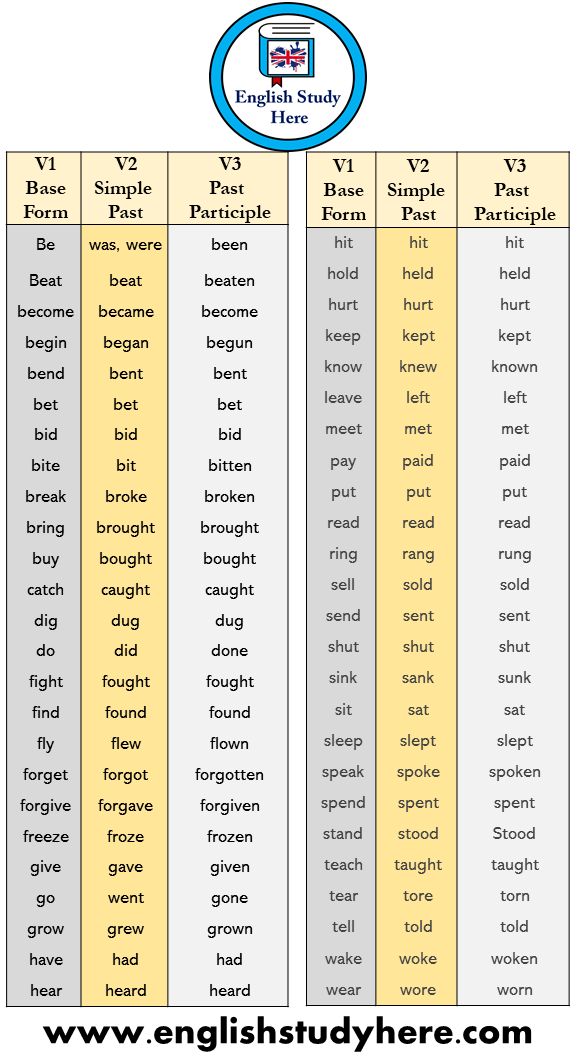The past tense refers to things that have already happened. When talking about the past, regular verbs have 'ed' on the end of them. Learn why 'ed' sends ver. Half past human. Adventures in future viewing. Blog; contact; home. 301 Moved Permanently.
$90,000,000
PLAY NOWPast Vs Passed
CONGRATULATIONS!
DOWNLOAD THE APP NOW
Instant Ticket Scanning Now Available!
Past tense verbs show what has already happened. However, the past tense can look quite different between regular and irregular verbs. Keep reading to find past tense verb lists with regular and irregular verbs conjugated into the past tense, as well as many helpful examples of each type of verb.
Past Tense Charts for Regular and Irregular Verbs

What you may know most commonly as the past tense is also called the past simple or the simple past tense. Regular verbs all tend to take on the same sort of endings in the past tense, while irregular verbs typically vary. The past tense verbs list below shows verbs conjugated into both past tense and future tense forms, while the irregular verb chart displays verbs in past tense and past participle forms.
In addition, regular verbs are also conjugated into their future tense form, while the irregular verbs are shown in their past participle forms too.
Regular Verbs Chart
Regular verbs follow a predictable, traditional pattern when conjugating into other verb tenses. There are three patterns you can use when writing a verb in past tense.
- adding -ed- for verbs that end in a consonant blend or vowel team and consonant, such as owned, guarded and feared
- doubling the last consonant and adding -ed - for verbs that end in a single vowel and consonant, such as dropped, grinned and hugged
- adding only -d - for verbs that end in a silent -e, such as named, ruled and stared
There are some exceptions to these rules, such as verbs that end in -c (add a -ked in past tense like picnicked or panicked), but for the most part, you conjugate all regular verbs in these three ways. Refer to the 21-page downloadable PDF document below when double-checking your spelling and conjugation. Usb wifi for mac os.
Regular Verb Example Sentences

A great way to understand verb conjugation is to read them in the context of a sentence. Each example sentence below demonstrates the present tense, past tense and future tense of the same word. Notice how they follow the three rules listed above.
Pastebin
Example 1:
- They ask a lot of questions. (present tense)
- They asked a lot of questions. (past tense)
- They will ask a lot of questions. (future tense)
Example 2:
- Joe bats a .300. (present tense)
- Joe batted a .300. (past tense)
- Joe will bat a .300. (future tense)
Example 3:
- Jane dreams of becoming an actor. (present tense)
- Jane dreamed of becoming an actor. (past tense)
- Jane will dream of becoming an actor. (future tense)
Example 4:
- The dog jumps for joy. (present tense)
- The dog jumped for joy. (past tense)
- The dog will jump for joy. (future tense)
Example 5:
- You own a Cadillac. (present tense)
- You owned a Cadillac. (past tense)
- You will own a Cadillac. (future tense)
Once you know the rules for regular verbs, you’ll be able to conjugate them into all sorts of tenses. But for irregular verbs, the rules don’t exactly reply.

Irregular Verbs Chart
While regular verbs follow a standard conjugation pattern, irregular verbs are a series of exceptions. The only way to know how to conjugate a given irregular verb is to memorize the variations. Study these irregular verbs in the downloadable PDF format below, including their corresponding past tense and past participle forms.
Irregular Verb Example Sentences
Just as with regular verbs, irregular verbs are best understood in the context of a sentence. But unlike regular verbs, seeing the progression between tenses isn’t always easy to predict. Read the examples below to see how many irregular verbs you know.
Example 1:
- Terrence beats the drum. (present tense)
- Terrence beat the drum. (past tense)
- Terrence has beaten the drum. (past participle)
Ip communicator for mac os. Example 2:
- Janine and Jessica catch fish in the river. (present tense)
- Janine and Jessica caught fish in the river. (past tense)
- Janine and Jessica have caught fish in the river. (past participle)
Example 3:
- Rocky fights with a lot of heart. (present tense)
- Rocky fought with a lot of heart. (past tense)
- Rocky has fought with a lot of heart. (past participle)
Example 4:
- You forget your password? (present tense)
- You forgot your password? (past tense)
- Have you forgotten your password? (past participle)
Example 5:
- They meet for lunch every week. (present tense)
- They met for lunch every week. (past tense)
- They have met for lunch every week. (past participle)
Using Past Tense Verbs
Although these past tense verb charts have covered a number of different verbs and their tenses, there are thousands of verbs in the English language. If you are not sure what word to use, double check the definition of the verb and review its past tense forms. Take a look at another verbs chart that includes singular and plural verbs for subject-verb agreement.
M.Ed. Education
